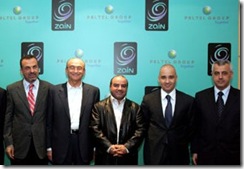In direct competition to Orange Jordan and Wataniya Palestine’s strategic agreement signed last week, Zain Jordan has announced a partnership with Paltel which will allow the Palestinian operator to become a member of Zain’s extensive ‘One Network’ roaming service.
 Zain Group CEO Al Barrak (centre) says Zain Jordan and Paltel are already acting in accord, as though a merger has been successfully completed
Zain Group CEO Al Barrak (centre) says Zain Jordan and Paltel are already acting in accord, as though a merger has been successfully completed
Orange and Wataniya created an alliance on January 19 which would see their customers on both sides of the Jordanian and Palestinian border call, receive and roam for only 12 piastres/85 agoras (US$0.17) per minute. Approximately 2.1 million subscribers would be able to take advantage of this strategic agreement.
In comparison, the Zain/Paltel deal will initially enable more than four million subscribers in both countries to pay local rates when roaming between Jordan and Palestine. Paltel’s mobile service Jawwal will join the network on February 1, with a view to its connection being expanded to all 22 other Zain One Network countries across the Middle East and Africa in the near future.
In addition Zain has revived its hopes of concluding its previously failed merger deal with Paltel by the end of 2010.
“We are now dealing as one company irrespective of ownership and as if we are two companies with one ownership until the merger is completed,” Zain CEO Saad al-Barrak stated.
In May 2009, Zain Group and Paltel signed an agreement for a cashless share-for-share exchange, which would have seen Zain take a majority interest in Paltel with an equity shareholding of 56.53 per cent, in exchange for Paltel owning 100 per cent of Zain Jordan. However, in November, the companies announced the planned merger was not ratified due to not receiving the required government approvals to complete the deal.




